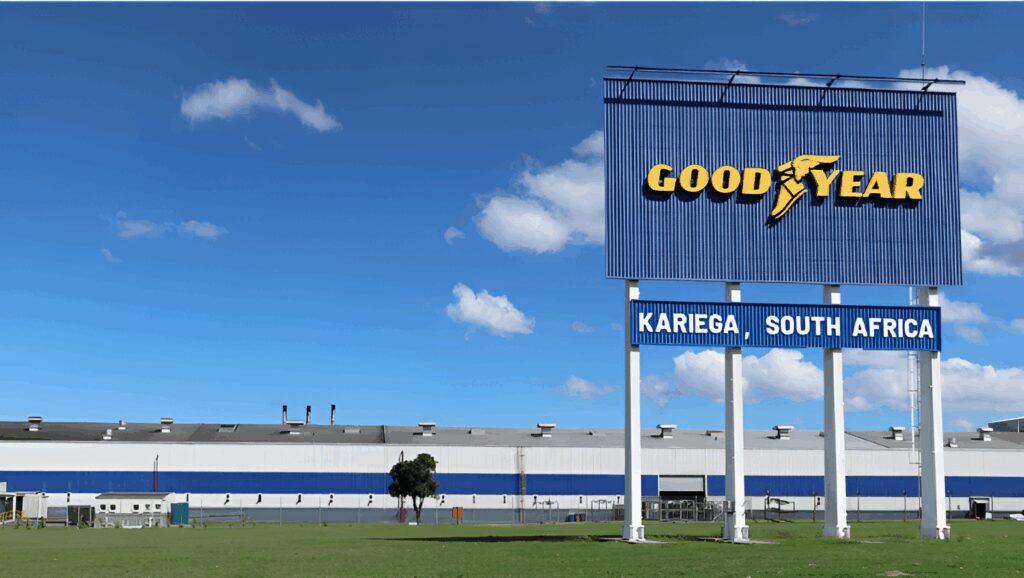In a move that underscores the mounting pressure on South Africa’s manufacturing sector, Goodyear has initiated a restructuring process that will see the closure of its long-standing manufacturing plant in Kariega (formerly Uitenhage) before the end of 2025. The plant shutdown will see the loss of over 900 direct jobs and countless more across the regional supply chain – dealing a major blow to South Africa’s already strained employment landscape.
Beyond the human cost, the shutdown will significantly impact the country’s commercial transport sector, with truck fleets set to lose local access to premium, South African-made tyres. As the truck tyre market becomes increasingly flooded with cheaper, lower-grade imports, fleet operators face rising concerns over durability, safety and long-term cost-efficiency.
Goodyear releases a plant closure statement
The decision to close the plant (in operation since 1947) was announced in a Goodyear statement and forms part of a broader strategic shift to streamline its operations in the Europe, Middle East and Africa (EMEA) region.
“Goodyear is transforming its go-to-market strategy in the Europe, Middle East and Africa region to optimise its footprint and portfolio,” the statement says.
As part of this transition, Goodyear South Africa launched a formal process under the Labour Relations Act to shut down its local manufacturing facility and realign certain sales, administration and management functions.
“Goodyear South Africa will continue to maintain a sales and distribution, and Hi-Q retail presence in South Africa,” the statement reads.
The company emphasises that the proposed changes are not a reflection of local staff performance. “This decision is in no way a reflection of the commendable efforts or the years of dedication of our South Africa team, for which we are grateful,” it says, adding; “as a company, we recognise our responsibilities towards our employees and their families and are firmly committed to acting fairly and providing them with appropriate support.”
The Commission for Conciliation, Mediation and Arbitration (CCMA) will facilitate the process.
Reaction from labour and business stakeholders has been swift. Phakamile Hlubi-Majola, spokesperson for the National Union of Metalworkers of South Africa (Numsa), confirms that the union has received a formal Section 189 notice from Goodyear, which is required to initiate the retrenchment process.
Incisive analysis from industry leaders
Denise van Huyssteen, CEO of the Nelson Mandela Bay Business Chamber, says the chamber is ready to support affected workers. “The chamber will assist workers through its job loss mitigation initiative,” she says, referring to a programme that connects companies seeking skilled workers with those affected by retrenchments. The chamber played a similar role following the closure of the Continental ContiTech plant in the same region.
Van Huyssteen voices concern about the broader trend. “This comes just months after Conti-tech announced that it was closing its plant; and the Bridgestone plant closure of over four years ago. This highlights the massive pressure which tyre manufacturers are under due to enabling environment issues such as the logistics challenges; lack of service delivery at a municipal level; inadequate maintenance of electricity, water and sanitation infrastructure; increased costs relating to safety and security; above-inflation input costs for essential services such as electricity; as well as cheap tyre imports which are flooding the market,” she says.
Industry leaders echo her concerns. Nduduzo Chala, managing executive of the South African Tyre Manufacturers Conference, which represents Bridgestone, Dunlop, Goodyear and Continental, says: “The market has been plagued with an unfair trade environment. It is a question of producers vs. importers and low-cost products have been introduced into the market.”
Chala notes that while the tyre industry has convinced government to impose anti-dumping duties on Chinese imports, new loopholes have emerged. “It is a very unfair trading environment,” he adds.
“But there are always loopholes and the Chinese companies are now shifting operations to Thailand, Cambodia and Vietnam. We now have to do the same for these countries. However, the sustainability of manufacturing has become challenging,” Chala concludes.
Editor’s comment: The imminent closure of Goodyear’s Kariega plant is more than a corporate restructuring – it’s a stark warning about the fragility of South Africa’s industrial fabric. With over 900 workers facing retrenchment in a region already grappling with high unemployment, the social fallout will be immediate and far-reaching. At the same time, fleet operators will be left to navigate a shrinking pool of premium, locally produced tyres, raising red flags around road safety, service reliability and long-term rolling rubber costs. As cheap imports continue to flood the market, the risk isn’t just economic – it’s operational, environmental and potentially fatal.
Ends




